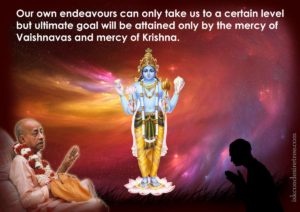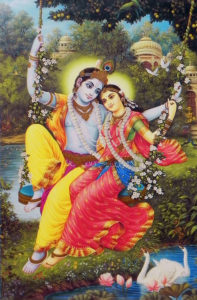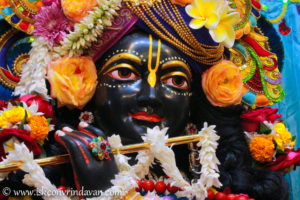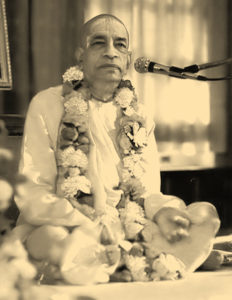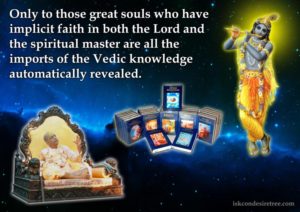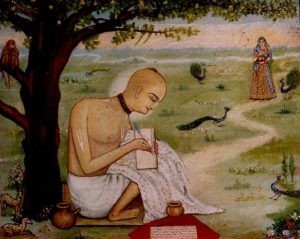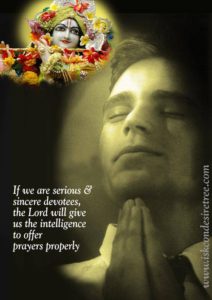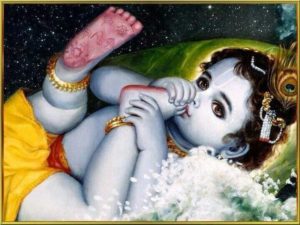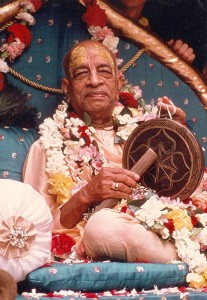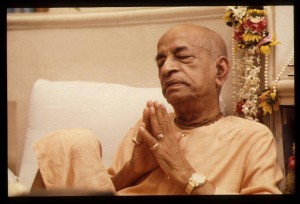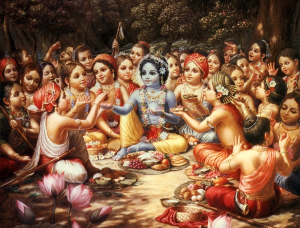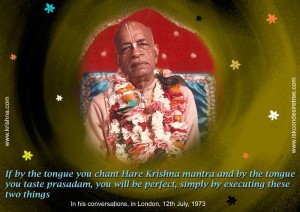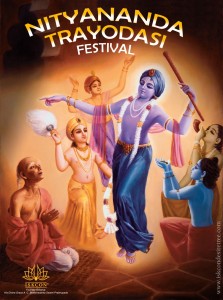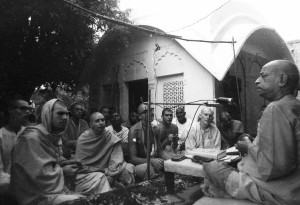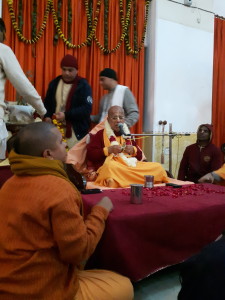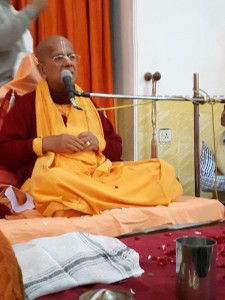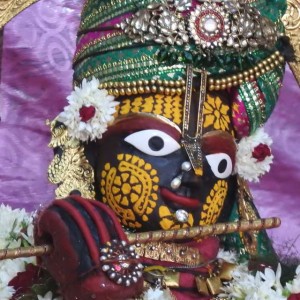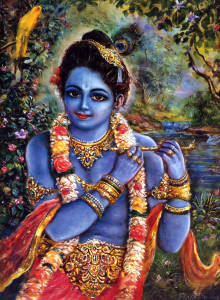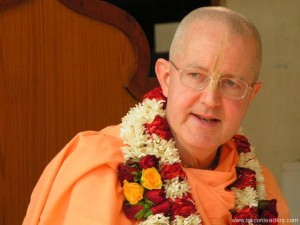Hare Krishna.
24th January, 2016. Gurgaon

I heard a wonderful lecture on Krishna Book by HG Srimati Mataji. I am quoting a small portion from the same lecture on how we should become a conscious cooperator in the hand of Lord.
Here is the text from ‘Krishna’ Book, chapter 4, where, having being warned by Durga Devi that the child who will kill Kamsa has already taken birth, Kamsa is now repenting and is also trying to justify all his past sinful actions, putting them behind the bars, killing their children, etc., as will of providence. In these lines lie some very enlightening lessons for an aspiring devotee like my own self.
“My dear sister Devakī, you are so gentle and kind. Please excuse me—don’t be aggrieved by the death of your children, which I have caused. Actually this was not done by me, because all these are predestined activities. One has to act according to the predestined plan, even unwillingly. People misunderstand that with the end of the body the self dies, or they think that one can kill another living entity. All these misconceptions oblige one to accept the conditions of material existence. In other words, as long as one is not firmly convinced of the eternality of the soul, one is subjected to the tribulation of being killer and killed. My dear sister Devakī and brother-in-law Vasudeva, kindly excuse the atrocities I have committed against you. I am very poor-hearted, and you are so great-hearted, so take compassion upon me and excuse me.”
-KB, chapter4
Here is the translation of the exact verse from Srimad Bhagavatam on this incident
My dear sister Devakī, all good fortune unto you. Everyone suffers and enjoys the results of his own work under the control of providence. Therefore, although your sons have unfortunately been killed by me, please do not lament for them.
SB 10.4.21
In the bodily conception of life, one remains in darkness, without self-realization, thinking, “I am being killed” or “I have killed my enemies.” As long as a foolish person thus considers the self to be the killer or the killed, he continues to be responsible for material obligations, and consequently he suffers the reactions of happiness and distress.
SB 10.4.22
When Devakī saw her brother actually repentant while explaining ordained events, she was relieved of all anger. Similarly, Vasudeva was also free from anger. Smiling, he spoke to Kaṁsa as follows.
SB 10.4.25
Srila Prabhupada writes in his purport that Devakī and Vasudeva, both highly elevated personalities, accepted the truth presented by Kaṁsa that everything is ordained by providence. According to the prophecy, Kaṁsa would be killed by the eighth child of Devakī. Therefore, Vasudeva and Devakī saw that behind all these incidents was a great plan devised by the Supreme Personality of Godhead.
This is a very important point, Kamsa is seeing it as providence where as Devakī and Vasudeva are seeing providence as the plan of the Lord. This is a big difference between a materialist and a devotee. Materialist is going to be talking about providence but devotee can see the hand of the Lord. The more advance we are the more we can see the hand of the Lord. Advance devotees don’t worry about anything happening around them as they know Lord has got all the controls. He has some plans…to direct things. Now our position is to become a consciousness cooperator.
Conscious cooperator
This is what we should aim for, become a Conscious cooperator, not whiner and griner! And also not just accepting, accepting, accepting or tolerating, tolerating, tolerating,..not like that also. We want to become consciousness cooperators.
Cooperate with Krishna. Okay! Krishna you have done this, You must have a plan. You are not envious of me so the plan must be for my betterment. So, please give me some insight so I can cooperate with Your plan.
Mataji said that bad things don’t happen to good people. Nothing is ever bad in Krishna consciousness. It’s just that sometimes we are just a little too thick, we keep on going in the same same groove. We can’t hear anything ( not get the subtle signals) and just remain in the same groove. So sometimes Krishna has to put a bomb under us to wake us up to the fact that there is something different that might be a better thing to do!
So this is interesting that Devakī and Vasudeva can see, these are highly elevated personalities, they can see that all the incidents are Krishna’s plan.
Let’s just see what those incidents were, locked up in jail for years, not just locked up but shackled…for years… and we are talking about a prince and princess, they were not ordinary persons. We are talking about someone who is used to all the luxuries, including respect and honour. So they are locked up, their children killed, year after year. And they are seeing all these incidents as indicator of plan of the Lord! That’s highly elevated personalities.
Prabhupada is writing Because the Lord had already taken birth, just like a human child, and was in the safe custody of Yaśodā, everything was happening according to plan, and there was no need to continue their ill feeling toward Kaṁsa. Thus they accepted Kaṁsa’s words.
So it’s interesting why they are giving up their ill feelings towards Kamsa? Because their ‘ishta deva’ is safe and sound so everything is fine. This is an insight into high their consciousness is. And Yashoda’s daughter didn’t get killed, that’s a relief for them, as they would have felt guilty about it.
We read further from Krishna Book chapter 4
Vasudeva told Kaṁsa, “My dear fortunate brother-in-law, what you are saying about the material body and the soul is correct. Every living entity is born ignorant, misunderstanding this material body to be his self. This conception of life is due to ignorance, and on the basis of this ignorance we create enmity or friendship. Lamentation, jubilation, fearfulness, envy, greed, illusion and madness are different features of our material concept of life. A person influenced like this engages in enmity only due to the material body. Being engaged in such activities, we forget our eternal relationship with the Supreme Personality of Godhead.”
This is a big statement: These types of activities make us forget our eternal relationship with Supreme Lord. So may be we don’t want all these activities as part of our mainstream activities.
Lets read the exact verse from Bhagavatam describing the same
Persons with the vision of differentiation are imbued with the material qualities lamentation, jubilation, fear, envy, greed, illusion and madness. They are influenced by the immediate cause, which they are busy counteracting, because they have no knowledge of the remote, supreme cause, the Personality of Godhead.
SB 10.4.27
The key in the above verse is ‘They are influenced by the immediate cause, which they are busy counteracting’ (does this sound familiar to our daily life many a times!)
Srila Prabhupada writes in his purport, it is really an amazing purport.
Kṛṣṇa is the cause of all causes (sarva-kāraṇa-kāraṇam), but one who has no connection with Kṛṣṇa is disturbed by immediate causes and cannot restrain his vision of separation or differences. When an expert physician treats a patient, he tries to find the original cause of the disease and is not diverted by the symptoms of that original cause. Similarly, a devotee is never disturbed by reverses in life. A devotee understands that when he is in distress, this is due to his own past misdeeds, which are now accruing reactions, although by the grace of the Supreme Personality of Godhead these are only very slight. When a devotee under the protection of the Supreme Personality of Godhead is to suffer because of faults in his past deeds, he passes through only a little misery by the grace of the Lord. Although the disease of a devotee is due to mistakes committed sometime in the past, he agrees to suffer and tolerate such miseries, and he depends fully on the Supreme Personality of Godhead. Thus he is never affected by material conditions of lamentation, jubilation, fear and so on. A devotee never sees anything to be unconnected with the Supreme Personality of Godhead.
The highlighted portion is a very powerful key for us.
So three things a devotee can follow when he is in difficulty and he won’t be affected by the material conditions are :
- he agrees
- he suffers, not just suffer but tolerates such miseries
- he depends fully on Supreme Personality of Godhead
Mataji strongly stressed ‘Give it a try, it works’!
And we see how Haridas Thakura got beaten in 22 market places. So many great vaishanavas, there is so much distress. It’s not like that their life was a bed of roses, so much difficulty. We know how much Prabhupada went through. But it doesn’t deter them, because of the above three qualities.
So as aspiring devotees we have to realise and take these points very very seriously and practice them. We are not going to become a vaishanava, a properly situated vaishnava, by reading about it or talking about it, that’s helpful as we will be able to know what it is about but the main thing is that we practice. Prabhupada tells us in his purport to BG8.28 that ‘these books are not meant for armchair speculators’. They are for practice.
Srimati mataji pushed hard the serious devotees ‘We can feel really good knowing all the verses, we can feel really good knowing the philosophy, where is feeling good going to get you!! We won’t go very far without practicing it.
The key thing here is, as Prabhupada writes,
A devotee never sees anything to be unconnected with the Supreme Personality of Godhead.
Mataji said that this is a very powerful thing on many many different levels. When we speak to highly evolved vaishanavas and we watch the way they interact with material energy, which for them is not material, it is very interesting. Because they only see Krishna’s plan! They don’t see their plan. So they have some idea what they want to do for Krishna today but if it doesn’t work out the way they expected, they don’t get disturbed by that. They just have a look, okay.. so what’s Krishna’s plan? And when one gets very very evolved he just loves Krishna’s plan! They are not here for their own plan, they are here for the boss’s plan! And that’s the most blissful platform, safest and most blissful.
And if we think we can be happy independent of Krishna… Forget it!!
So next time if something doesn’t work out the way we expected it to work out then instead of playing the controller, and doing yelling and screaming (internally or externally) instead of doing that we should just hold our breadth, hold our tongue and say okay, what’s Krishna wants me to do here. If we just try it we will be in a lot less anxiety.
Hence all these points are meant for application in our devotional practice and not just merely to store all this as information.
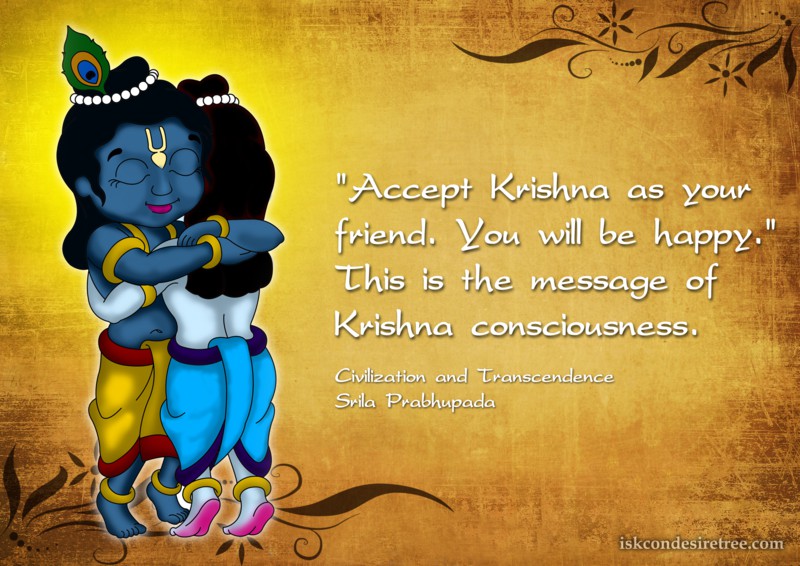
Now let me share a little application of the above principle.
Last week was quite a tight week one for me at work, home and the classes. I had receive a service, priority no.1 one for me, to assist a senior devotee with some search and editing work which I was to submit on 16th Jan. And Shyamsundar Prabhu had requested me to give a ‘serious’ class on Isopanishad, verse 17, on 14th Jan, This was a book I had read long time back and not studied seriously. Then there was a class at my own home on 15th Jan, and on top of all this I committed for a class on 13th Jan as well. This line up did not include some work for a weekend assignment which I had not even touched! And that my wife & son were away and I was to take care of my teenage daughter at home and work pressure for a new project was high. Phew!
So middle of the week on 13th Jan, under mental pressure, I thought I had taken up too much to chew. It was becoming clear to me that there is no way I can complete the service given by the senior devotee which was top priority for me. I also felt guilty that 13th January being ‘Lohri’ and a holiday for my daughter I should have thought about it and stayed home in the evening instead of committing myself to a class. I then wrote a SMS to Shayamsundar Prabhu that I can’t do the class at his home this week and let’s keep it for some other time. I was about to send the SMS but somehow I remembered that I am trying to handle everything using my own intelligence and ability. On one side I keep on praying for service and when the services have come I can’t refuse on my own, I need to take shelter.
I prayed to Srila Prabhupada for guidance and help, that let whatever he thinks is good for me spiritually let it happen and I will follow it.
The instant inspiration was not to send the SMS cancelling the class. I deleted the drafted SMS. I called up Sitarani mataji who gave me some excellent tips on how to have mood of bhakti and not ‘jnana’ for the Isopanishad class. I thought of reaching home early and complete my service for the editing for the senior devotee but got stuck in the office and could not leave early. I hurriedly came home in the evening, sheepishly said sorry to my daughter for not being able to spend to spend time with her and leaving her alone. I felt guilty for my action. I left home but as soon as I come out on the main road I found the whole road blocked with traffic. I thought of double checking it with Amit Prabhu, whose house was the class. Prabhuji replied that some of his family members are not there today and also there are not too many confirmations for the class so he politely suggested that we can drop the class today. I accepted it as will of Lord and hurriedly came back home thinking that I will not be leaving my daughter alone now and will also get some time to work on the editing work.
As I had not even entered the home Ravi prabhu called up. Prabhuji wanted to come over as he was in Gurgaon. I welcomed Prabhuji but told him that our meeting has to be short as I need some time to complete a service. By the time I changed, finished the evening arti and was about to open the work, Prabhuji walked in. We had early dinner prasadam together and during our discussion I shared how I was under pressure for a particular editing work which I had completed but all the alignment etc. in the soft copy was not all my forte and I don’t know how this will get complete by 16th. Prabhuji immediately offered to assist me in the same and said he can complete the same in a day! My anxiety level instantaneously came down by 90%! I profusely thanked Srila Prabhupada and Krishna for these sudden changes.
Next day I woke up early and for next 6 hours I prepared hard for the Isopanishad class. I wasn’t quite satisfied as I finally left for office. I thought of taking the day off from office but two urgent and very critical issues were at hand and I had to face them. I tried hard to reach home early but could not do so. On the way back I had the driver so I thought I will get time to prepare but my japa rounds were pending. After a moment of introspection I decided to first complete my rounds rather than prepare for the class. I prayed to Holy name to please help me concentrate on chanting and not on the anxiety for the unprepared class looming over my mind. I also prayed to Holy Name to help me serve the devotees in the evening as I had tried hard but failed to prepare well and now needed support of His mercy. I was able to chant without much anxiety as I left myself at the mercy of Holy Name.
As I reached home, I hurriedly read my notes. I was again anxious seeing the long length of my notes, no coherent flow in my mind for the class and my obvious lack of preparation. As I sat in the car to leave for the class I thought of letting go the whole preparation and just read Srila Prabhupada’s long purport of verse 17. I thought let me just keep on explaining each para a little bit and the class will be done nicely and I will not be under pressure to deliver a ‘serious’ class. Again I prayed to Srila Prabhupada and sought guidance. I clearly felt the message to give the class in the format I was struggling to prepare. I accepted it. At this time I still had three more round of chanting left, we faced some traffic and I was able to complete my last round as the car stopped outside Prabhuji’s home. I wanted to sit in the car for few more seconds and go over my notes one last time but some devotees were already outside Prabhuji’s home and they noticed me.
With a little anxious heart I entered Prabhuji’s home, again prayed hard to Srila Prabhupada to help me serve the devotees by bringing them closer to his and Lord’s lotus feet. I gave the class in the same format I felt inspired.
By Srila Prabhupada’s, and Lord’s, mercy I managed to serve the devotees and did not know how the class went for almost two hours. I was very much relieved when Shyamsundar prabhu stated, as I was leaving his home, that he liked the content of the class. I thanked Srila Prabhupada and the Holy Name. I sang loud kirtan all the way back home. My faith in the power of shelter and prayer to Srila Prabhupada and the Holy Name had taken one step forward.
Thanks to Ravi Prabhu, I was able to complete the assignment from the senior devotee next day and submitted it on time and to the satisfaction of the senior devotee. The two critical pending issues at my office too got resolved with unexpected help. The class at home went fine as my parents came over to help and stay over the weekend. Mentally free, I was able to visit Vrindavan Dhama on Saturday, for a night, and got some much needed association, on the way as well in the Dhama!
My learning:
- Accept that all challenging circumstances are for my own benefit and improvement, they are in fact mercy of Lord.
- Become a conscious cooperator, ‘align’ with what is happening and utilise these circumstances to build some ‘spiritual muscle’.
- Always take shelter of Srila Prabhupada and Lord Krishna and seek what lesson I am supposed to learn from these circumstances.
- Try not to have mental blocks, that this is ‘spiritual’ and this is ‘material’! Everything is under the control of Lord Krishna and it is my contaminated consciousness which makes me see things or circumstances independent of Krishna. As an aspiring devotee I should practice to see Krishna’s presence in everything around me and there is no part of my life which I should see as being ‘material’.
All glories to the wonderful journey of being in Krishna consciousness.
All glories to Sri Guru and Gauranga.
All glories to Srila Prabhupada.
P.S.: I am surprised to share that this is the 200th blog since I started writing two years back. The blog was visited by 11,637 visitors, from 123 countries, last calendar year and has 320 subscribers. Thank you so very much for your support. http://www.forthepleasureoflordkrishna.com
I offer my respectful obeisances to Śrī Caitanya Mahāprabhu. By the potency of the shelter of His lotus feet, even a fool can collect the valuable jewels of conclusive truth from the mines of the revealed scriptures. (CC Adi 3.1)


